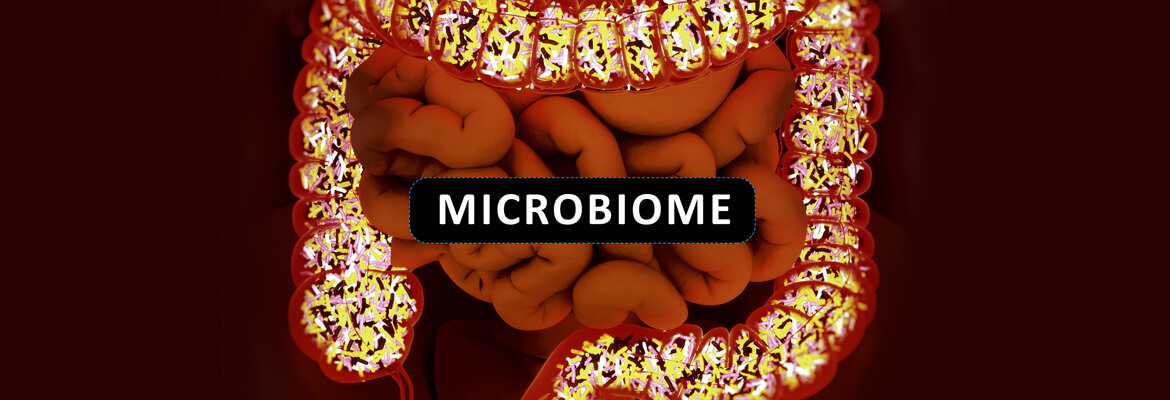01
2021
DIGESTION, FOODS AND YOUR MICROBIOME

Digestion, foods and your microbiome
We are born pure, unfettered, without any contamination. But did you know that the moment you exit the birth canal, you start picking up the microbes from your environment? As Raphael Kellman says in The Microbiome Diet, ‘You become 90 percent microbe’. If we look at ourselves, we are 10 percent human and 90 percent microbes. The collection of microorganisms that make their home in us are called human microbiota, and microbiome (the genetic code of each microorganism) is a miniature world of non-human organisms (microbiota) that flourish within your gastrointestinal tract.
The different communities that reside within us are like different sects or different cultures living in different parts of our bodies. For example, the bacteria living in your digestive tract are different from the ones that live in your lungs. It’s almost as though we exist as ecosystems and not individuals. Here, we will focus on bacteria as well as the yeasts, viruses and parasites that make up your gut microbes. These are the body’s microbiota that help you fight against disease and are also the pre-cursors i.e., a weak microbiome to many diseases and health conditions; especially irritable bowel disease, cancers, candida, inflammation, food intolerances,autoimmune disease. You have more bacterial cells then human cells, so you can only imagine the quantum of microbes. Your microbiome has a regulatory effect on your brain function and mental health as well. So therefore it impacts, anxiety, depression, stress, and may brain disorders. Digestion mainly takes placed in the small and large intestine where trillions of bacteria and microorganisms exist.
Think of your gut as a garden—rich and green. Go ahead and visualize it. Now think of these friendly microorganisms inhabiting that harden. How you choose to build the soil (i.e., the nutrition through food) to keep these microorganisms nourished and healthy is entirely up to you. This is the key to everything in your life. This plays a crucial role in our health and outward manifestations of it (skin, hair, nails, glow, weight, mind, attitude, and a whole lot more). According to me, this is the missing link in all diets.
Research on Covid-19 and the gut (gut.bmj.com and Gut Journal) reports that gut microbiome composition was significantly altered in patients with COVID-19 compared with non-COVID-19 individuals. Association between gut microbiota composition, levels of cytokines (large group of proteins, peptides secreted by specific cells of the immune system. Cytokines are produced throughout the body by cells of diverse origin and are crucial in controlling the growth and activity of immune system cells and blood cells. When released they tell the immune system to do its job) and inflammatory markers in patients with COVID-19 suggests that the gut microbiome is involved in the magnitude of COVID-19 severity possibly via modulating host immune responses.
The gut microbiome and your diet
The breakdown of gut microbiome is referred to as ‘dysbiosis’ An imbalance in the gut microflora, with an overgrowth of the bad ones, as opposed to the good ones will lead to dysbiosis. Causes of dysbiosis are attributed to: Impaired digestion, hypochlorhydria (basically low stomach acid, leading to undigested food remaining longer in the stomach than it should), overuse of antibiotics throughout one’s life, ethanol (ethyl alcohol) in the blood than normal due to yeast overgrowth, NSAIDs (basically pain-relievers), slow transit time-decreased peristalsis, impaired immune status, and dietary factors.
One crucial factor linked to the breakdown of gut bacteria is consuming processed foods. People who eat minimally processed foods: whole grains, vegetables, nuts, eggs and foods that are in season are mor likely to keep in the good bacteria. Sweetened foods, sugars, white refined grains (commercial bread), processed meats, was associated with bad gut bacteria composition and poor metabolic health as well.
What can we do it aid a build-up of beneficial gut bacteria?
Eat high fibre foods, Justin and Erica Sonnenburg have used a term called MACs – Microbiota Accessible Fibre. These are fibres that the gut microbes feed on, its food for them. It is the cornerstone of the Macrobiotic approach. Your gut microbes only respond to what you eat, and you need to seriously think of what you feed them or don’t feed them. Here is what you should be eating to feed them –
- Whole grains, especially brown rice and millets.
- Vegetables, especially colours and leafy greens.
- Beans and lentils (what we Indians call our dals), this could include soybean products like tofu and tempeh.
- Nuts and seeds.
- Fruit, especially seasonal and local.
- Fermented foods: sauerkraut, kimchee, pickles, kefir.
- Fish and eggs if you are a non-vegetarian.
- Indian spices and herbs.
- Drink teas (mainly decaffeinated), avoid coffee.
Alcohol, sugar, garlic, red meats, chicken, cheese, dairy, refined flour products (will cause heat to build up (Ayurveda terms these as pitta aggravating foods as well). These should be avoided while you have a health issue going on. Foods that will help disperse the heat are: ginger, leafy greens, cabbage, sprouts. If congested and stagnated then use: a little ginger in cooking, green onions, leekhs. Seek to balance the liver by including leafy greens and bitter/sour foods: mustard, radish, green apples, rocket (arugula) leaves, fenugreek (leaves/seeds), mustard greens, barley grass, lime, apple cider vinegar, mustard.
In conclusion, having a healthy microbiome is really the key to fight any ailment, and also given the current scenario fight COVID-19.
